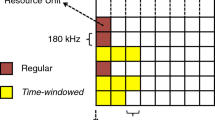Abstract
In this paper, we address the problem of efficient recourse allocation in CDMA wireless networks supporting multimedia services with various and often diverse QoS prerequisites, placing special emphasis on real-time services’ essential requirements satisfaction. We first provide an analytical framework for studying real-time users’ short-term delay and throughput properties under fundamental opportunistic scheduling policies. The corresponding results demonstrate that probabilistic delay constraints are insufficient indicators of real-time services’ QoS prerequisites, while probabilistic short-term throughput requirements are more appropriate in asserting their performance expectations. Based on these observations and results, we propose and develop a scheduling policy for efficiently supporting heterogeneous services that include delay-tolerant non-real-time and delay-sensitive real-time services, over a wireless CDMA system under a common utility based framework. A user’s utility characterizes his degree of satisfaction for the received service as well as QoS expectations fulfillment, in a normalized way. Aiming at the maximization of users’ utilities, both non-real-time services’ long-term and real-time services’ short-term throughput QoS requirements are met, under the proposed opportunistic scheduler. Finally, via modeling and simulation it is demonstrated that significant performance improvements concerning both types of services’ QoS requirements satisfaction are achieved through the proposed scheduling approach.
Similar content being viewed by others
References
Berggren F., Kim S.-L., Jäntti R. and Zender J. (Oct. 2001). Joint power control and intracell scheduling of DS-CDMA nonreal time data. IEEE Journal Selected Areas in Communications 19(10): 1860–1870
Bender P., Black P., Grob M., Padovani R., Sindhushyana N. and Viterbi S. (Jul. 2000). CDMA/HDR: A bandwidth efficient high speed wireless data service for nomadic users. IEEE Communications Magazine 38(7): 70–77
Andrews, M., Qian, L., & Stolyar, A. (March 2005). Optimal utility based multi-user throughput allocation subject to throughput constraints. In Proceedings of IEEE INFOCOM’05, (Vol. 4, pp. 2415–2424).
Liu Y., Gruhl S. and Knightly E. (Sept. 2003). WCFQ: An opportunistic wireless scheduler with statistical fairness bounds. IEEE Transactions on Wireless Communications 2(5): 1017–1028
Liu X., Chong E. and Shroff N. (March 2003). A framework for opportunistic scheduling in wireless networks. Computer Networks 41: 451–474
Kulkarni, S., & Rosenberg, C. (Nov. 2003). Opportunistic scheduling policies for wireless systems with short term fairness constraints. In Proceedings of IEEE GLOBECOM, (Vol. 1, pp. 533–537).
Meshkati F., Goldsmith A.J., Poor H.V. and Schwartz S.C. (Aug. 2007). A game-theoretic approach to energy-efficient modulation in CDMA networks with delay QoS constraints. IEEE Journal on Selected Areas in Communications 25(6): 1069–1078
Shakkotai, S., & Stolyar, A. (2002). Scheduling for multiple flows sharing a time-varying channel: The exponential rule. American Mathematical Society Translations, Series 2, Vol. 207.
Andrews M., Kumaran K., Ramanan K., Stolyar A., Whiting P. and Vijayakumar R. (Feb. 2001). Providing quality of service over a shared wireless link. IEEE Communications Magazine 39(2): 150–154
Kastrinogiannis, T., & Papavassiliou, S. (June 2007). Satisfying elastic short term fairness in high throughput wireless communication systems with multimedia services. In Proceedings of IEEE ICC.
Li C. and Papavassiliou S. (Dec. 2003). Fair channel-adaptive rate scheduling in wireless networks with multirate multimedia services. IEEE Journal on Selected Areas in Communications 21: 1604–1614
Jalali, A., Padovani, R., & Pankaj, R. (2000). Data throughput of CDMA-HDR a high efficiency-high data rate personal communication wireless system. In Proceedings of 51st IEEE VTC 2000-Spring Conference, (Vol. 3, pp. 1854–1858).
Kushner H.J. and Whiting P.A. (July 2004). Convergence of proportional-fair sharing algorithms under general conditions. IEEE Transactions on Wireless Communications 3(4): 1250–1259
Sarkar S. and Tassiulas L. (Jun. 2002). Fair allocation of utilities in multirate multicast networks: A framework for unigying diverse fairness objective. IEEE Transactions on Automat Control 47(6): 931–944
Wang H. and Moayeri N. (March 1995). Finite-state Markov channel—A useful model for radio communication channels. IEEE Transactions on Vehicular Technology 44: 163–171
Author information
Authors and Affiliations
Corresponding author
Rights and permissions
About this article
Cite this article
Kastrinogiannis, T., Papavassiliou, S. Utility Based Short-term Throughput Driven Scheduling Approach for Efficient Resource Allocation in CDMA Wireless Networks. Wireless Pers Commun 52, 517–535 (2010). https://doi.org/10.1007/s11277-008-9632-9
Published:
Issue Date:
DOI: https://doi.org/10.1007/s11277-008-9632-9




